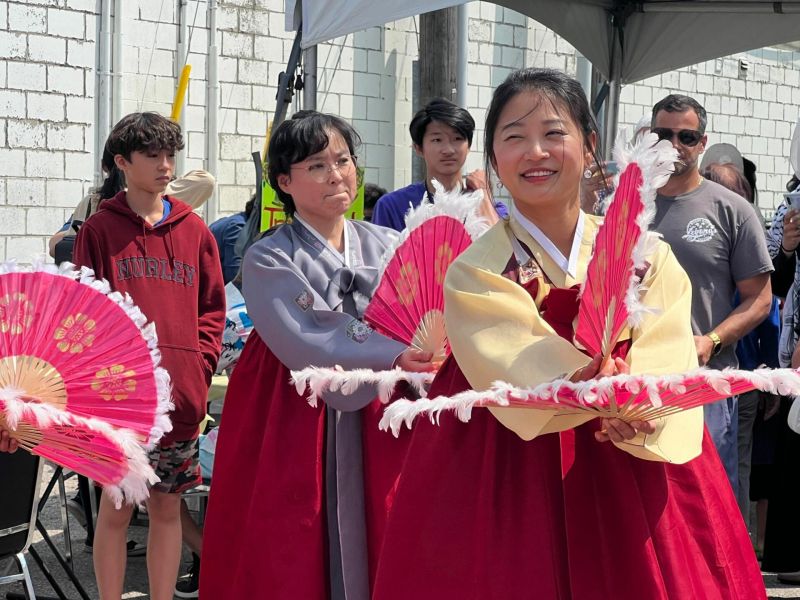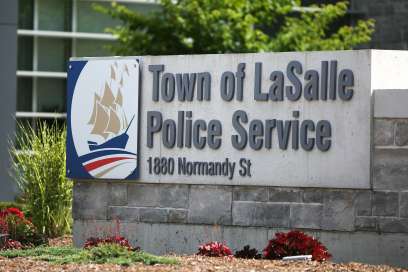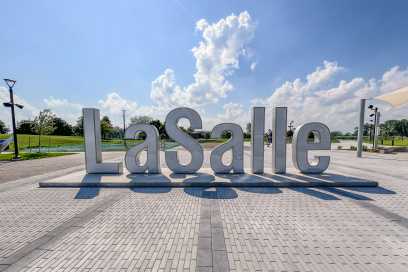Local Theatre Partners With Museum To Share Story Of Black History
Partnering with a local museum, one theatre company is putting the spotlight on some important history.
Taking place on Friday February 28th, Arts Collective Theatre (ACT) will present The Price of Freedom at the Capitol Theatre (located at 121 University Avenue West) With an original story focusing on black history in the area, the event will also be part of Amherstburg Freedom Museum’s 50th anniversary celebrations.
Although production came together quickly, the idea was first discussed in February 2024.
“I approached ACT Board Member Shelly Davis about an idea for a play,” said Vice Chair of the Amherstburg Freedom Museum Board of Directors, Barbara Porter. “I asked [Davis] to connect me with [ACT Artistic Director/Price of Freedom director] Chris Rabideau and [ACT Vice President] Moya McAlister to see if they would be willing to work with the Amherstburg Freedom Museum on doing this play. [Rabideau,] [McAlister] and myself had a ZOOM meeting to discuss my idea. Both felt my idea about runaway slaves telling their stories could be done on a bigger scale.”
While the project was originally envisioned as a showcase, Rabideau and McAlister felt it could be more impactful as an original play written, developed and performed locally.
After Porter agreed, ACT set out to find someone who could fully realize their ideas.
“[Amherstburg Freedom Museum Assistant Curator] Irene Moore-Davis recommended Carlos Anthony, a seasoned author and filmmaker, though he had never written a play before,” said McAlister. “[Rabideau] and I were excited by this challenge and set up a meeting with [Anthony,] who enthusiastically accepted the opportunity to craft his first theatrical script.”
Set in 1860’s Canada, The Price of Freedom revolves around John Anderson. Seeking freedom, the black man is accused of murder for killing a bounty hunter in self-defense. Sought across borders, his court case soon becomes a flashpoint for Canada’s moral and legal identity as the United States demands his extradition. Supported by abolitionists from the Underground Railroad and allies in an important fraternity, Anderson must confront tense courtroom drama, his memories of escape and a collective fight for dignity and justice.
Work on the project saw Anthony, Rabideau, McAlister, Porter and Moore-Davis start by spending a day at the Amherstburg Freedom Museum. Immersing themselves in the surrounding area’s history, the first time playwright soon became familiar with Anderson’s story. He then used this as the foundation for The Price of Freedom.
Once decided, Moore-Davis and Elise Harding-Davis were brought in as historians to ensure accuracy and provide feedback during script revisions.
“From the outset, the museum played an integral role in shaping the project,” said McAlister. “Their support extended beyond providing historical guidance; they helped connect us with local historians and ensured the script remained true to the lived experiences of Black Canadians in Windsor-Essex. As the script evolved, the museum’s team continued to provide feedback and resources. Their curators participated in the script workshop phase, ensuring the accuracy of historical details and adding depth to the narrative.”
Completing his first draft in August, Anthony then presented it to Rabideau and McAlister. Focusing on staging requirements and refining story elements, their feedback was implemented and allowed the community to get involved with workshopping. Undertaken in November and December, this phase included local actors, historians, educators and curators from the Amherstburg Freedom Museum. Thanks to their partnership with the historical organization, ACT was able to engage with community members more easily as well.
Paying tribute to the stories of black Canadians, other resources were then put into making the play even more compelling.
“To further enhance the production, we brought on Ian Smith to compose original music,” said McAlister. “[Smith] is an award-winning Canadian composer with over 30 years of experience in film, television and theatre. His extensive background in musical composition and live performance made him the perfect fit for this project.”
Continuing to create something unique, both partners continued offering whatever resources they could to the project. Using their experience, ACT focused on developing new talent, promoting the production and drawing upon past instances of producing socially conscious plays. This comes from staging new work annually through their social justice theatre projects and North of 50 program.
When it came to the museum’s contributions, they went well beyond script consultations.
“The Amherstburg Freedom Museum played a critical role in ensuring historical accuracy and authenticity,” said McAlister. “Their expertise guided costume design, promotional efforts, marketing strategies and educational outreach, ensuring that the production remained true to the historical realities it sought to portray. Through their collaboration, ACT and the museum worked together to present a piece that was both artistically compelling and historically responsible.”
It’s a marriage that brought both sides together in deeply integrated ways that go beyond the play itself. Meeting at All Saints’ Anglican Church, rehearsals and workshops took place at a venue with historically significant ties to black history: The site once served as temporary housing for fugitives escaping slavery on the Underground Railroad. Opening the play at the Capitol Theatre was also strategic, re-enforcing ACT’s commitment to downtown Windsor’s arts community and maximizing the production’s impact in the area.
Using a script intended to evolve, auditions were held at the beginning of January. While many participants from the community workshops took part, other actors outside of this group were needed to fill out the cast. When finding their actors, those involved prioritized people who could authentically convey the significant reality of the play. Beyond acting ability, it was just as important that performers understood the story’s emotional and historical weight.
While some cast members are less experienced as a result, it wasn’t long before everyone worked together to benefit the play.
“Even though many of the actors are new to the stage, their passion and dedication to this work make the play truly beautiful,” said McAlister. “The cast has embraced a spirit of teamwork, with experienced actors mentoring and supporting those making their stage debuts. Over the past two months, the group has become a family, building each other up and working together outside of rehearsals to refine their performances. Their commitment ensures that the city will witness the best they have to offer, and watching their growth throughout this journey has been nothing short of inspiring.”
Even so, casting still presented a challenge. Although finding people for most roles wasn’t difficult, casting the lead role of John Anderson became an issue. Putting more thought into it however, Rabideau eventually asked Anthony to portray the character. Despite his initial hesitation, the playwright agreed, translating his understanding of Anderson from script to stage. Given his connection to the figure through deep research and writing, Anthony’s insight and commitment added depth to the role.
Going immediately into rehearsals, actors came in three to five times a week. Those prominently featured were on hand more often with Anthony being at the top of the list. A dynamic workshop-style approach was also taken by Rabideau, implementing script revisions after each session. Going through everything scene by scene, lines were adjusted based on the play’s evolving direction.
This provided more clarity and emotional connection for everyone.
“The play evolved through an ongoing dialogue between [Anthony,] cast and director,” said McAlister. “Actors had the opportunity to contribute to revisions, making the process highly collaborative. Their voices and performances actively shaped the final version, lending authenticity and depth to the storytelling.”
When it comes to staging, a dynamic set was needed to pull off scenes from a courtroom along with integrated flashbacks. Looking to create something functional as well, a multi-level environment with strategically placed doors was constructed. Allowing seamless transitions, the main interrogation room that also serves as the courthouse remains as the focus with other scene work taking place around it. This results in a simple set that supports the storytelling.
When it came to representing other visual elements accurately though, ACT looked beyond their immediate circle for some extra help.
“For costumes and props, historical accuracy was key,” said McAlister. “We were fortunate to receive support from the Amherstburg Freedom Museum and the University of Windsor’s School of Dramatic Art, both of which provided valuable period-appropriate items. Their collections will help transport the audience to the 1800s, enhancing the play’s immersive experience.”
Pulling these elements together, the Vice-President acknowledges it wouldn’t have been possible without the city’s support either.
“The ACT Board of Directors, Amherstburg Freedom Museum, and the Price of Freedom cast, crew and production team is grateful for the support of the City of Windsor’s Arts, Culture and Heritage Fund,” she said. “Their generous contribution enabled us to commission original music for the play, procure essential set materials and cover the fee for our set builder. We extend our heartfelt thanks to the Fund for playing a vital role in bringing our vision to life.”
Looking to foster a better understanding and appreciation of black heritage among young audiences, a panel will also be held following the play’s February 27school show. Aiming to explore its themes in more detail for those in grades 7-12, this discussion will include topics such as the historical context and significance of events depicted, impact of black history on contemporary society, personal stories and experiences related to black heritage, strategies for promoting inclusivity and diversity in educational settings and the creative process of developing The Price of Freedom. It’s an opportunity that will let students engage critically with the material, ask questions and connect with experts who share an interest in Black History.
In addition, ACT has also teamed up with the Greater Essex County District School Board. Tailored to middle and high school students, they’ll Provide curriculum connections and classroom resources that align with the play. This includes lesson plans and materials focused on topics ranging from civil rights events to discussions about race in current events.
Keeping these thoughts on students’ minds is also crucial to ensuring progress moving forward.
“”It’s essential to emphasize that Black history is deeply woven into the fabric of Canadian history,” said McAlister. “Many students may not realize the significant contributions of Black Canadians (especially those with ties to Windsor-Essex County) in shaping the nation’s history.
The story of The Price of Freedom serves as a powerful reminder that these narratives have often been overlooked in mainstream education and it’s crucial to address these gaps …We, at ACT, are honoured to use its platform to make sure these stories are heard, especially at a time when the next generation needs to understand the full depth of Canada’s history—one that includes these pivotal, yet often forgotten, stories of Black Canadians.”
The Price of Freedom takes place at the Capitol Theatre on February 28th, March 1st and 2nd. Friday and Saturday performances will start at 7:30pm while Sunday features a 2:00pm
matinee. Admission is $33 for adults or $30 for students and seniors. Tickets can be purchased from the Capitol Theatre box-office during operating hours or online.
No matter their backgrounds, the show promises to connect with audiences all the same.
“In addition to the powerful themes and educational value, The Price of Freedom is a play that truly speaks to everyone, not just the Black community,” said McAlister. “It’s an invitation for all of us, youth, adults and families,to reflect on our shared history and appreciate the rich cultural tapestry of our region. Residents of Windsor-Essex have a unique opportunity to learn about the incredible leaders who shaped the community we know today. This play honours their contributions and highlights the significant role our region played in Black history.”
Beyond this, the Vice-President is looking forward to the production for another reason.
“ACT is especially proud to partner with the Amherstburg Freedom Museum to kick off their 50th anniversary with this impactful production,” she said. “It’s an occasion to celebrate the legacy of the museum and the extraordinary work they’ve done for the community over the years. We want to see this show sold out to honour their incredible contributions and we encourage everyone to take part in this experience.””
Those looking for more information on both organizations can visit the Amherstburg Freedom Museum and ACT Windsor online.

























